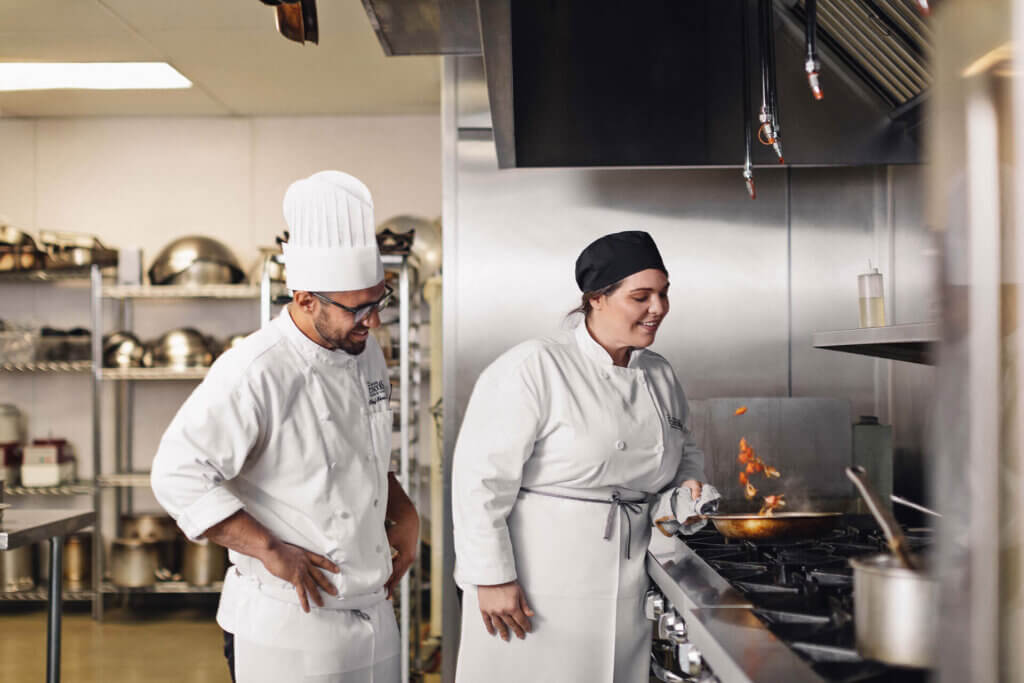Most people could get hired for a typical job in a restaurant. But how do you position yourself as someone who could quickly advance through the ranks of the kitchen brigade? What do you need on your resume so that you’re considered for competitive openings in fine dining restaurants and other coveted positions in the industry?
We’re going to talk about four specific traits restaurants look for when hiring, how culinary school can help you develop them, and how a culinary education can help set you apart from those who haven’t invested in themselves.
Here are four traits restaurants look for when hiring new chefs:
1. Confidence in the Cooking Fundamentals
Looking for a job in the culinary industry? At a minimum you will need to have some basic cooking skills. The specific fundamentals restaurants look for include cooking methods, knife skills, food safety, and sanitation. It is also important that you can plan out your steps and multi-task while keeping your space clean and organized.
The Culinary Foundations course, part of the culinary arts degree or diploma program, covers basic techniques like terminology, seasoning, cooking methods, knife skills, mise en place, food safety, and sanitation. These specific techniques are taught by a variety of Chef Instructors and then practiced with weekly assignments. An industry externship in a professional kitchen provides additional opportunities to practice and gain confidence in these skills.

Fundamental techniques can form the cornerstone of countless recipes
Even more important than your current level of skills is being dedicated to learning, practicing, and improving on those skills. Just because you have a degree or diploma doesn’t mean that you’re instantly ready to take on an executive chef position…but it does show that you’re committed to being your best and to always be improving. As Escoffier Graduate Jamie Warburton puts it “Confidence will come when you are humble enough to understand that you still have to learn. That is something that this school has taught me.”
With practice, the basics become so second nature that you don’t even need to think about them. That’s when you start to move around the kitchen with calm confidence.
When chefs can hire people who are confident in their fundamental skills, it makes it easier for them to teach all the nuances of their specific restaurant and menu.
2. Open to Taking Direction & Feedback
When you are hired for a new position, there is a lot to learn. Each restaurant has its own menu, kitchen layout, management style, and quality expectations. As you are learning the ropes, you will receive constant directions and feedback, from owners, general managers, and chefs…each with their own personalities and communication styles.
At Escoffier, Chef Instructors provide evaluations after each assignment. This offers an opportunity to practice receiving and accepting feedback. Each of those evaluations are opportunities for growth.
A culinary industry externship provides an opportunity to receive feedback in a real-world environment. With the support of Escoffier staff, students can work through how to best react and learn from those experiences.
All of these experiences build each student’s ability to accept direction and feedback. Being able to turn feedback into a learning experience helps to prepare students for the workforce.
3. Business Mindset and Leadership Skills
Cooking fundamentals alone are not enough to become a successful chef. You also need the mindset to run the operations of a professional kitchen. The tactical skills needed to do this include an understanding of financials, cost control, and managing inventory. Leadership skills are also an asset in the kitchen, ensuring that everyone is working together for the success of the restaurant.
In the Purchasing and Cost Control course that is part of the online Food and Beverage Operations program, students learn how to minimize costs including inventory, portion control, and recipe costing. The Culinary Entrepreneurship course in the Culinary Arts programs covers such topics as business planning, pricing, government regulation, and legal concerns.
Both of these courses build foundational kitchen management and business skills. Aspiring chefs can demonstrate that they are business-minded by showing their interest in the financial aspects of the restaurant and being invested in working with the team for its success. They need to demonstrate 100% integrity and ethical behavior at all times to build trust. Once trust has been built, you could advance to higher leadership roles.
Whether you have a leadership title or not, showing leadership in the kitchen is a strength that can set you apart. This includes being able to teach and train, having strong communication skills, and working cooperatively with others. It is also about setting a vision for the kitchen and inspiring others to put in 110% to work towards the common goals of creating an excellent product and turning a profit.
In the Foodservice Management course students explore the hierarchy of management in food service, and the skills needed to succeed as a manager including training employees, motivating them, disciplining them, and creating a safe and positive work environment.
One of the best ways to learn good management and leadership skills is through watching others you admire and want to emulate. Students can learn these skills from Chef Instructors and during their externship. Receiving education and mentorship about cost control, management, and leadership provides Escoffier students with a unique skill and mindset that is attractive to restaurants.
4. Committed to The Industry
According to the National Restaurant Association, turnover in the restaurant industry is over 70% annually! It costs time, money, and resources to hire people who just end up quitting or getting fired for poor performance. Employees who stay, on the other hand, provide stability, increased productivity, decrease costs and mistakes, and improve the overall morale and work culture.
People who have attended culinary school are making an investment in themselves and declaring that they want this to be their career, not a stepping stone. They come to the workforce with confidence in their skills and a great attitude for learning. They bring not only their knowledge but an understanding of how to be a life-long student.
“If somebody goes to culinary school, it shows extra commitment and follow through…it’s a ‘gold star’ on their resume.”
Josh Hasho, Executive Chef, Omni Hotels & Resorts
When applying for jobs, culinary students can demonstrate their dedication to the restaurant industry through the time and financial commitment that has been made. This dedication along with the technical, management, and leadership skills they have learned set them up for a long, successful career.
Want more information about our degrees and diplomas? Learn more here!
More articles on preparing for a career in the culinary industry:
- The Importance of Organization in the Kitchen
- Is a Culinary Degree or Diploma Worth It?
- What is Food and Beverage Management?
This article was originally published on May 2, 2016, and has been updated.


